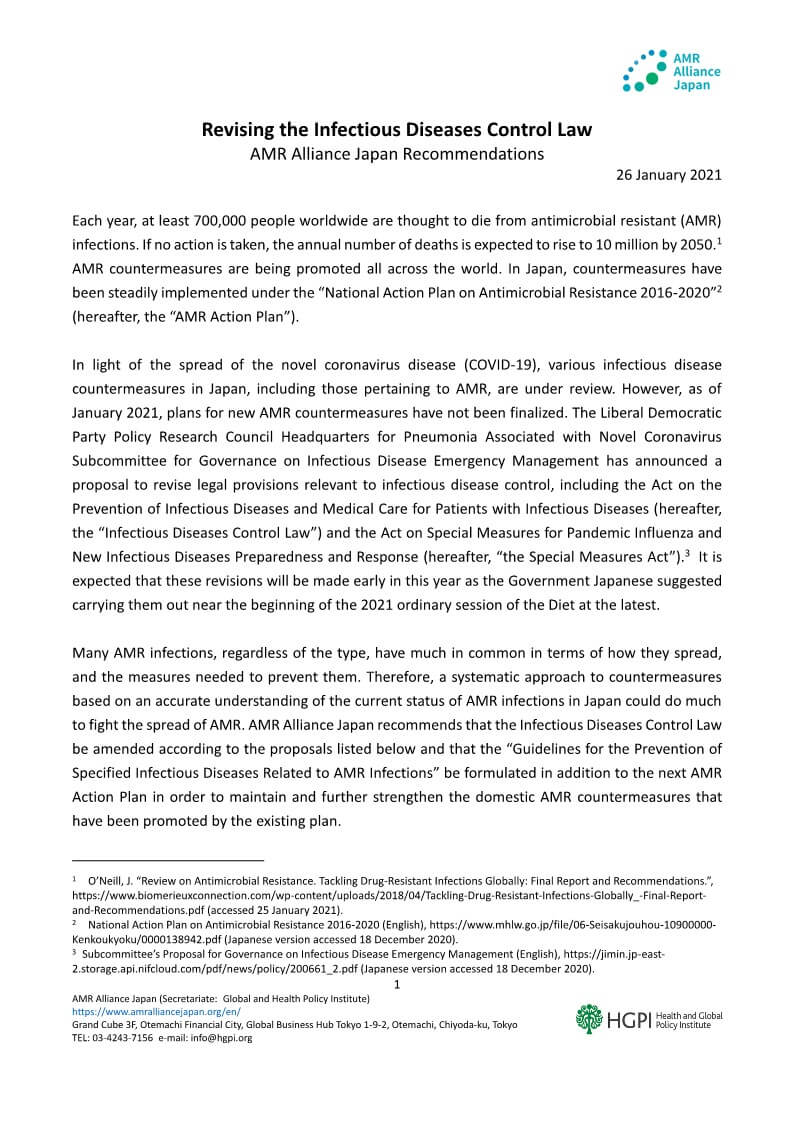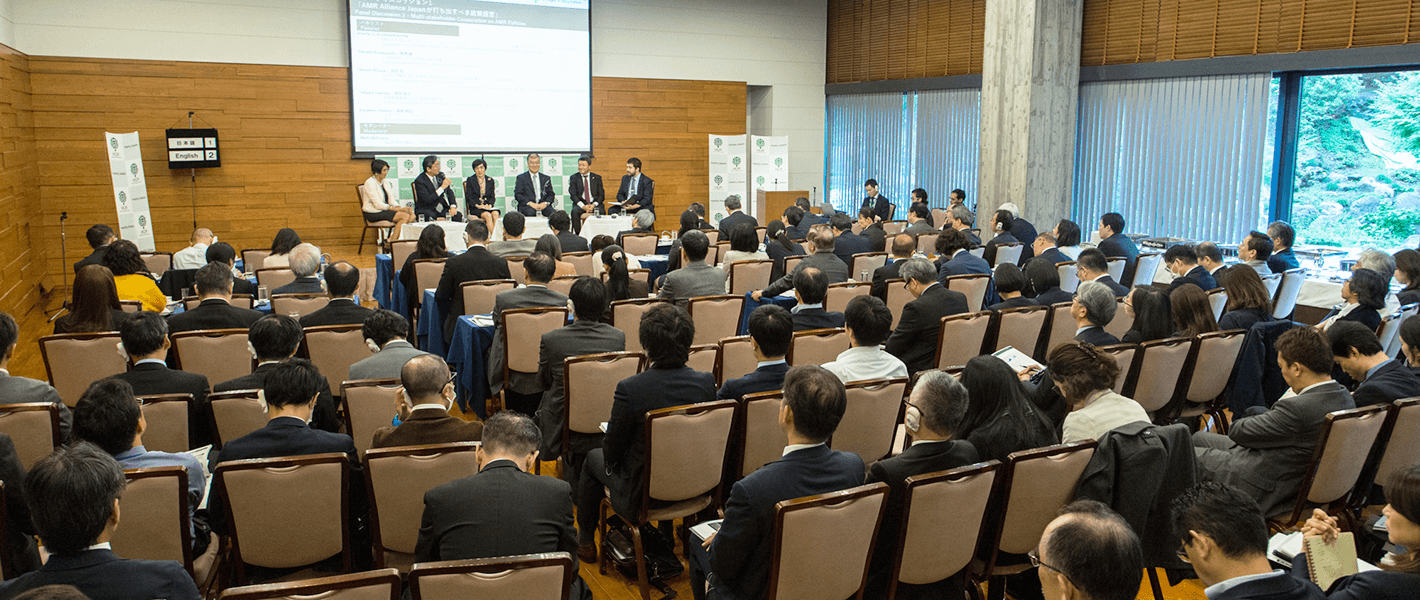[Press Release] Don’t Ignore the ‘Silent Pandemic’ of AMR in Revisions to the Infectious Diseases Control Law and Other Laws (January 26, 2021)
- Home >
- Information >
- News >
- [Press Release] Don’t Ignore the ‘Silent Pandemic’ of AMR in Revisions to the Infectious Diseases Control Law and Other Laws (January 26, 2021)
AMR Alliance Japan
FOR IMMEDIATE RELEASE
Don’t Ignore the ‘Silent Pandemic’ of AMR in Revisions to the Infectious Diseases Control Law and Other Laws
AMR Alliance Japan issues new recommendations on
law revisions needed to strengthen Japan’s AMR countermeasures
Tokyo, January 26, 2021 – AMR Alliance Japan has released recommendations for the revision of the Act on the Prevention of Infectious Diseases and Medical Care for Patients with Infectious Diseases (hereafter, abbreviated as the ‘Infectious Diseases Control Law’) and other laws related to antimicrobial resistance (AMR) in Japan.
As we use antimicrobials more and more, the microorganisms that cause infectious diseases adapt, and grow resistant to treatment. This naturally occurring process is called “antimicrobial resistance” (AMR). Each year, at least 700,000 people worldwide are thought to die from antimicrobial resistant (AMR) bacterial infections. If no action is taken, the annual number of deaths is expected to rise to 10 million by 2050.
Although AMR is a serious threat to public health, there is still much that we do not know about the exact, current situation of AMR in Japan, or how to best respond to it. That said, many AMR infections, regardless of the type, have much in common in terms of how they spread, and the measures needed to prevent them.
AMR Alliance Japan recommends that the Infectious Diseases Control Law be amended as follows and that the “Guidelines for the Prevention of Specified Infectious Diseases Related to AMR Infections” be formulated in the next AMR Action Plan in order to maintain and further strengthen the domestic AMR measures that have been promoted by the plan.
- “Antimicrobial resistant (AMR) infections” should be defined as a single infectious disease under the Infectious Diseases Control Law.
- The enforcement regulations of the Infectious Diseases Control Law should provide for the establishment of guidelines on the prevention of specific infectious diseases related to AMR.
- The scope of Act on Special Measures for Pandemic Influenza and New Infectious Diseases Preparedness and Response should include AMR infections.
This proposal is the result of several months of interviews with experts both inside and outside the Alliance, and was created in the hopes of improving AMR countermeasures via the Infectious Diseases Control Law. Specific recommendations can be found below.
AMR Alliance Japan will continue to contribute to the strengthening of policy in Japan, with the aim of protecting the public from the threat of AMR.
AMR Alliance Japan / The Health and Global Policy Institute
Revising the Infectious Diseases Control Law
AMR Alliance Japan Recommendations
26 January 2021
Each year, at least 700,000 people worldwide are thought to die from antimicrobial resistant (AMR) infections. If no action is taken, the annual number of deaths is expected to rise to 10 million by 2050.1 AMR countermeasures are being promoted all across the world. In Japan, countermeasures have been steadily implemented under the “National Action Plan on Antimicrobial Resistance 2016-2020”2 (hereafter, the “AMR Action Plan”).
In light of the spread of the novel coronavirus disease (COVID-19), various infectious disease countermeasures in Japan, including those pertaining to AMR, are under review. However, as of January 2021, plans for new AMR countermeasures have not been finalized. The Liberal Democratic Party Policy Research Council Headquarters for Pneumonia Associated with Novel Coronavirus Subcommittee for Governance on Infectious Disease Emergency Management has announced a proposal to revise legal provisions relevant to infectious disease control, including the Act on the Prevention of Infectious Diseases and Medical Care for Patients with Infectious Diseases (hereafter, the “Infectious Diseases Control Law”) and the Act on Special Measures for Pandemic Influenza and New Infectious Diseases Preparedness and Response (hereafter, “the Special Measures Act”).3 It is expected that these revisions will be made early in this year as the Government Japanese suggested carrying them out near the beginning of the 2021 ordinary session of the Diet at the latest.
Many AMR infections, regardless of the type, have much in common in terms of how they spread, and the measures needed to prevent them. Therefore, a systematic approach to countermeasures based on an accurate understanding of the current status of AMR infections in Japan could do much to fight the spread of AMR. AMR Alliance Japan recommends that the Infectious Diseases Control Law be amended according to the proposals listed below and that the “Guidelines for the Prevention of Specified Infectious Diseases Related to AMR Infections” be formulated in addition to the next AMR Action Plan in order to maintain and further strengthen the domestic AMR countermeasures that have been promoted by the existing plan.
“Antimicrobial resistant (AMR) infections” should be defined within the Infectious Diseases Control Law
Many AMR infections, regardless of the type, have much in common in terms of how they spread, and the measures needed to prevent them. Therefore, a systematic approach to countermeasures based on an accurate understanding of the current status of AMR infections in Japan could do much to fight the spread of AMR. AMR Alliance Japan proposes that infectious diseases caused by the following pathogens should be defined as “antimicrobial resistant (AMR) infections” under the Infectious Diseases Control Law, and necessary countermeasures should be taken to address them. Necessary countermeasures should be designed based on the prevalence of each infection and the current state of countermeasures. Infections that should be considered AMR infectious are as follows.
- Tuberculosis (multidrug-resistant and extensively drug-resistant tuberculosis)
- Methicillin-resistant Staphylococcus aureus
- Carbapenem-resistant Enterobacteriaceae
- Third-generation cephalosporin-resistant Enterobacteriaceae
- Vancomycin-resistant Staphylococcus aureus
- Vancomycin-resistant Enterococci
- Penicillin-resistant Streptococcus pneumoniae
- Multidrug-resistant Acinetobacter
- Multidrug-resistant Pseudomonas aeruginosa
- Candida auris
- Antimicrobial-resistant gonorrhoea
- Nontuberculous mycobacteria
- Clostridioides difficile
- Antimicrobial-resistant mycoplasma genitalium
- Antimicrobial-resistant candida
- Azole-resistant Aspergillus fumigatus
- Antimicrobial-resistant Helicobacter pylori
- Multidrug-resistant Bacteroides fragilis
- Antimicrobial-resistant campylobacter
- Antimicrobial-resistant Salmonella
- Quinolone-resistant Shigella
- β-lactamase-nonproducing ampicillin-resistant Haemophilus influenzae
- Antimicrobial-resistant group A streptococcus
- Antimicrobial-resistant group B streptococcus
The classification under the Infectious Diseases Control Law should be defined based on the mode of transmission of AMR infections and the treatment of carriers. In addition, a detailed study by experts is required on the information necessary for an accurate understanding of the current status of AMR infections (should include pathogen information of patients with AMR infections, antimicrobials used, outcomes, and the time period). Moreover, the effective use of the Health Center Real-time information-sharing System on COVID-19 (HER-SYS), which was developed as a COVID-19 countermeasure, should be considered as a method of collecting information.
The enforcement regulations for the Infectious Diseases Control Law should provide for the establishment of guidelines for the prevention of specific infectious diseases related to AMR
Basic guidelines are needed to maintain the promotion of domestic AMR policies over the medium- to long-term for the next 5 to 10 years. In that vein, the enforcement regulations for the Infectious Diseases Control Law should stipulate the development of guidelines as prescribed under Article 11 (Prevention Guidelines for Specified Infectious Diseases) of the same law. Furthermore, the “Prevention Guidelines for Specified Infectious Diseases Related to AMR Infections” should be prepared with reference to the AMR Action Plan. The following should be included in the guidelines:
- Promote the appropriate use of antimicrobials
➢ Set appropriate performance indicators
・In setting goals for promoting the appropriate use of antimicrobials, it is important to take into account current treatment practices. Performance indicators (numerical targets) that do not lead to the uniform and excessive suppression of antimicrobial use (suppression of appropriate use) should be considered. This can be achieved by specifying region, disease, etc., in targets and designing targets based on existing data or questionnaires directed toward medical institutions.
➢ Add incentives to the infection control implementation system
・The healthcare system should appropriately reward the work of infectious diseases specialists to provide diagnosis and treatment advice when needed, including through the creation of financial incentives within the medical fee system.
・The healthcare system should appropriately reward efforts to conduct active surveillance of AMR via polymerase chain reaction (PCR) tests and rapid microbial identification and susceptibility testing, including through the creation of financial incentives within the medical fee system.
・A system should be established to collect information related to the newly defined antimicrobial resistant (AMR) bacterial infections (including information on the amount of antimicrobials being used, the detection of AMR bacteria, information on outbreaks of AMR infections, information related to infection control measures, etc.). It is crucial that this system be designed in such a way that considers the capacity of healthcare organizations to contribute data and maintain the system.
➢ Foster specialists
・Efforts should be made to encourage the training of the diverse specialists that will be needed to operate an AMR infectious disease control system. The healthcare system should incentivize human resources to train as infectious disease specialists, certified medical technologists in clinical microbiology, and so on, through the creation of rewards within the medical fee system, and other measures.
・Similarly, efforts should be made to incentivize human resources to train as specialist pharmacists who can make use of their knowledge of pharmacokinetics and pharmacodynamics, including therapeutic drug monitoring (TDM), to play a central role in antimicrobial stewardship efforts. Incentives should be established within the medical fee system and through other means.
- Develop incentives to sustainably support antimicrobial research and development
➢ Currently, experts from industry, government, academia, and the private sector are deliberating on a pull incentive model that could be implemented in Japan in addition to push incentives.4 That work should be referenced when considering and implementing measures to promote antimicrobial research and development.
➢ In addition, appropriate pricing policies for pharmaceuticals that help to address the problem of AMR should be considered.
- Ensure a stable supply of antimicrobials
➢ In September 2020, the Ministry of Health, Labour and Welfare’s “Stakeholder Meeting on Stabilizing the Supply of Pharmaceuticals” compiled a list of measures to ensure stable supplies of pharmaceuticals, including antimicrobials. Specific measures should be developed based on the summary report of that meeting.5
The scope of Act on Special Measures for Pandemic Influenza and New Infectious Diseases Preparedness and Response should include AMR infections
Especially for those AMR infections caused by tuberculosis (multidrug-resistant and extensively drug-resistant tuberculosis) and antimicrobial-resistant gonorrhoea, it may be necessary in the future to take emergency measures similar to the those prescribed under the Special Measures Act. Consideration should be given to including AMR infections within Article 2 (definitions) of that Act.
–
1 O’Neill, J. “Review on Antimicrobial Resistance. Tackling Drug-Resistant Infections Globally: Final Report and Recommendations.”, https://www.biomerieuxconnection.com/wp-content/uploads/2018/04/Tackling-Drug-Resistant-Infections-Globally_-Final-Report-and-Recommendations.pdf (accessed 25 January 2021).
2 National Action Plan on Antimicrobial Resistance 2016-2020 (English), https://www.mhlw.go.jp/file/06-Seisakujouhou-10900000-Kenkoukyoku/0000138942.pdf (Japanese version accessed 18 December 2020).
3 Subcommittee’s Proposal for Governance on Infectious Disease Emergency Management (English), https://jimin.jp-east-2.storage.api.nifcloud.com/pdf/news/policy/200661_2.pdf (Japanese version accessed 18 December 2020).
4 The 7th NIKKEI FT Communicable Diseases Conference, “Yokohama Communicable Diseases Statement 2020” (English), https://adweb.nikkei.co.jp/kansensho2020/7thnfc_statement2020_en.pdf (Japanese version accessed 18 December 2020).
5 Stakeholder Meeting on Stabilizing the Supply of Pharmaceuticals Summary (Japanese), https://www.mhlw.go.jp/content/10807000/000676422.pdf (accessed 18 December 2020).
■ AMR Alliance Japan (Secretariat: Health and Global Policy Institute)
https://www.amralliancejapan.org/en/
Grand Cube 3F, Otemachi Financial City, Global Business Hub Tokyo 1-9-2
Otemachi, Chiyoda-ku, 100-0004 Tokyo
Tel: 03-4243-7156 Fax: 03-4243-7378
E-mail: info@hgpi.org (For inquiries, contact: Matt McEnany)



